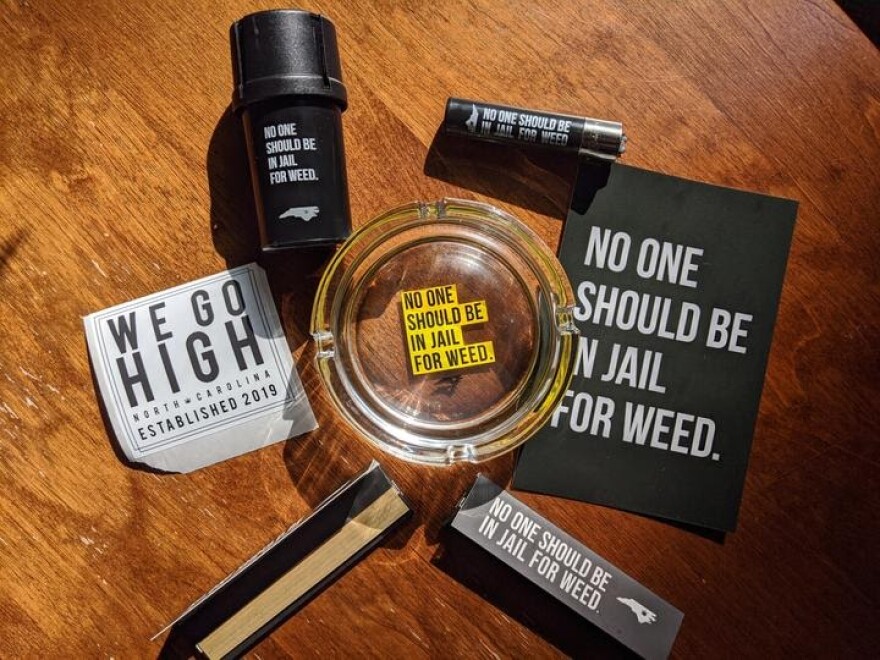Hemp — including smokable hemp — is legal in North Carolina. But that is only the case if the hemp does not contain more than trace amounts of THC, the main psychoactive compound in marijuana. Hemp and marijuana can be similar in appearance. Both contain some level of THC, though hemp’s concentration is much lower.
It can be difficult to determine whether or not a plant strain contains enough THC to be illegal without extensive testing. But marijuana possession is still a punishable offense in the state, regardless of whether or not that test is conducted. Host Anita Rao talks through the complexity of state law with Phil Dixon Jr., defender educator at UNC-Chapel Hill’s School of Government. Marijuana pharmacist Markita Wilburn and marijuana decriminalization advocate Ashe Phoenix, co-founder of We Go High NC, also join the conversation to share the benefits of these products and their arguments for legalization.
Five Things You May Not Know About Marijuana
Hemp and Marijuana Don’t Produce The Same Effects
Though they may look and smell similar — especially in similar form — hemp, which is legal to farm, sell and consume in North Carolina does not produce the same high as marijuana. Marijuana pharmacist Markita Wilburn describes the difference: “Hemp is essentially an immature form of cannabis,” she explains. “It has very low amounts of THC, which is the psychoactive cannabinoid within that plant, which causes that euphoria that we all may know marijuana to be associated with. Hemp is very high in CBD, which is non-psychoactive, whereas cannabis can cultivate both THC and CBD, THC being the more dominant cannabinoid in that plant.”
Confusing Hemp and Marijuana Complicates Arrests And Convictions
Since hemp is legal and marijuana is not, and because they can look and smell so similar, police have some difficulty distinguishing the two, which can lead to consumers having complicated run-ins with the law. Once a person has been arrested for suspected use of marijuana, the burden of proof is on them to prove that they were using legal hemp and not illegal marijuana. Says defender educator Phil Dixon, “In North Carolina, an officer has [historically] been able to identify marijuana by sight or smell only. And their opinion that something was marijuana was sufficient in court to prove the identity of the substance. That's at least in doubt now, given the existence of legal hemp. We need now to test the product to determine what exactly the THC level of the substance is.”
Dixon adds, “Unfortunately, our crime lab is not doing that testing.” When testing is pursued, it’s done by private labs, which can lead to a slightly wider margin of error. For possession in small amounts, testing is not routinely pursued in court cases.
Possession of Less Than Half An Ounce of Marijuana Is A Low-Level Crime That Still Carries Consequences
Dixon says that national organizations often classify North Carolina as a state where marijuana has been decriminalized. “That’s simply wrong,” he corrects. “Marijuana remains a crime in North Carolina in any amount. Under a half ounce is a class three misdemeanor, and that's our lowest level of any crime, but it is a crime.” A conviction most often results in a fine, but can disqualify college students from federal student aid and, in rare cases, can still lead to a jail stay of up to 20 days.
North Carolina Voters Cannot Decide To Legalize Marijuana By Ballot Initiative
In other Southern states where marijuana has recently been legalized, voters have had the opportunity to show their support via the ballot. “There's just simply no mechanism under state law or the state constitution for citizens to put something on the ballot. So any change will have to come any, any systemic change on a statewide level will have to come from the General Assembly. And there have been bills filed for several years in a row attempting to do that, but they haven't gained any any traction in the legislature.
Some Legalization Advocates Believe There’s No Difference Between Recreational and Medicinal Marijuana Use
Ashe Phoenix, co-founder of the marijuana legalization advocacy group, We Go High NC, says that one of the organization’s central ideas has to do with separating types of marijuana use. “We think that there is actually no difference between recreational and medicinal [use] and that all cannabis use is medicinal use. If you think about it, pre- and post-pandemic, where there's this huge collective anxiety, any offering you're giving yourself, any way that you're in introducing joy into your life, that's an offering not only to yourself, but also to your community. And in that way, even if you're using cannabis to have fun or have a good time or relax, all of those are endeavors toward wellness and healing. And we think of that as a medicinal practice.”










